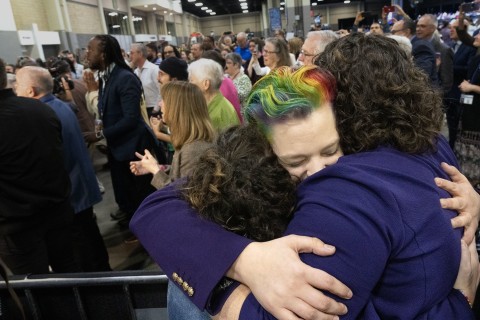May 9, Ascension (Luke 24:44–53)
In his final moments on earth, Jesus delivers a last lecture—with footnotes.
I’m not new here. I know full well that preachers and writers are never supposed to cast themselves in the role of Jesus. It’s the most off-putting mistake an interpreter of the gospel can make. Still, I am going to break the rules to admit that lately, when I read Luke’s account of the ascension, I can’t help but relate to the Son of God. Not in the manner of a messiah complex; thankfully I’m not that far gone. I just resonate with Jesus’ urgency to cover all the bases in his final communications to his followers before bouncing off to the wild blue yonder.
My poetry professor used to say that unlike in prose, where superfluous words can stow away unnoticed, in a poem every word matters. Every noun must be relevant, every adjective justified. (No adverbs allowed.) Suddenly my preaching is subject to similar exigencies. I know precisely how to number my days in this particular pulpit. I’m not about to be carried up to heaven, but as I write this I am just two sermons away from relocating to Wisconsin. I’ve served the same suburban Chicago congregation for nearly 14 years, and with the announcement of my new call we’ve been thrust into a painful countdown to when I will no longer be one of their pastors.
Read our latest issue or browse back issues.
Jesus had three years with his disciples to teach them everything he knew, and he still launches into a colossal synopsis of the nature and purpose of his life, death, and resurrection in his final moments on earth. It’s a last lecture with footnotes, as he cross-references his curriculum vitae with scripture. The law, prophets, and psalms coalesce on his resurrected tongue. He admits that it is a rerun; these are words he has already spoken. But he can’t resist the impulse to remind them of what they are already supposed to know. As the tide of teaching recedes, he begins blessing them. The wordy Word made flesh (to borrow a Johannine superlative) is still speaking words of benediction when he makes his final ascent.
My own final sermons have also been urgent revisitations of the same themes that have emerged in my preaching in the past few years. I find myself desperate to proclaim the “God who is God,” a phrase from Andrew Root’s oeuvre. That phrase burned through the thick layers of secularism that had long dampered my capacity to hear or witness the truth of gospel. For the first chapters of my ministry, I desperately wanted to believe in the God revealed in Jesus Christ. I just couldn’t quite suspend my postmodern incredulity long enough to do much more than desire belief. I aimed for integrity in the pulpit. At the very least, I preached what I wanted to believe, but my sermon manuscripts were littered with asterisks of doubt on every page. It was safest to proclaim orthopraxy and metaphorize the hell out of miracles.
But then, by the grace of God, I was encountered by the God who is God. I crossed over to the other side of the impossibly vast crevasse separating secular cynicism from wholehearted faith. I find myself unexpectedly trusting that everything God accomplished through the life, death, and resurrection of Jesus Christ is true, trustworthy, and salvific. I find myself profoundly convinced of the reality of resurrection and ascension—which is to say that the resurrection and ascension of Jesus Christ are real, and that the resurrection and ascension of Jesus Christ comprehensively reorder reality.
In a lecture at the inaugural Doxology conference in 2022, Trygve Johnson referred to “the privileged lethargy and spiritual malaise of a Protestant liberalism that is dying from within for lack of a conviction and confidence in the resurrected and ascended Christ.” Hearing those words both hurt and healed my heart. I know that privileged lethargy. I lived that spiritual malaise. I suffered the internal death that emerges from Easter ambivalence. I’m still stunned that I’m not there anymore. Stunned and grateful.
And so, like Jesus (there I go again), I want my last words to my congregation to be a clear and unapologetic proclamation of a suffering Messiah who died and was resurrected. I want to preach repentance and forgiveness in his name. I want to bless them with words of benediction that are as weepy as they are wordy. And after we’ve all dried our eyes from the sad farewell, I want them to come back the next Sunday with great joy in their hearts as they worship and bless the God who is God.





